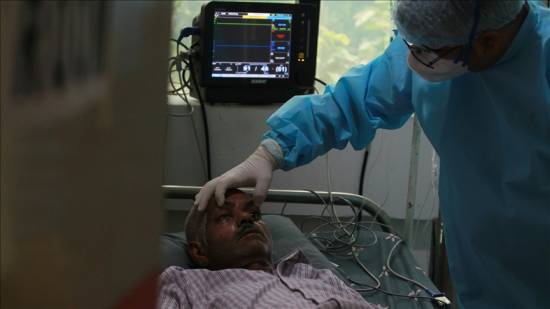Collaborations like the South-South cooperation are much needed for developing countries amid the coronavirus pandemic and India's role in diplomatically and economically supporting global south states is more important than ever, experts observed.
On the eve of UN Day for South-South Cooperation on Sunday, observers also point out that the South-South Cooperation -- technical collaboration among developing countries in the Global South -- is now an important vehicle for advancing interests of "emerging societies."
"South-South cooperation has long been a point of emphasis in Indian foreign policy, and it is needed now more than ever before. The Global South faces multiple crises, including the impacts of climate change, the challenges of accessing and delivering effective COVID-19 vaccines and related public health equipment," Frank O'Donnell, a scholar who works on South-South Cooperation primarily in its BRICS (Brazil, Russia, India, China and South Africa) region form at US-based Tufts University, told Anadolu Agency.
Traditionally, India had been an active player in the South-South Cooperation until the early 1990s. Since then, it has made a conscious effort to work with the US and the Western world. Consequently, China has filled the vacuum through its engagement with countries in the Asia Pacific, Africa and Latin American regions.
But of late, India has again rediscovered the importance of South-South Cooperation and has been participating in various projects.
Examples include the India-UN Development Partnership Fund, managed by the UN Office for South-South Cooperation, which is working rapidly to support projects that respond to COVID-19 across Global South countries. And India, Brazil and South Africa are running a Facility for Poverty and Hunger Alleviation, which supports an e-Learning project.
O'Donnell, an expert on South Asian foreign policy, said building the necessary infrastructures -- from green energy sources, education, health care system development -- to generate the sustainable and inclusive development in the Global South is "one of the most imperative tasks of the 21st century."
He said India's role diplomatically and economically supporting Global South states is now important.
"The reality of many states in the Global South as potentially lucrative emerging markets means that India’s continuing role in diplomatically and economically supporting Global South states is more important than ever before," he said.
O'Donnell also believes that China may be the only serious actor engaged in addressing the problems, but adds, "in ways that maximize Chinese political influence and tie the recipient state into political commitments to China that it can ill afford."
"(Indian Prime Minister Narendra) Modi has sought to revive the IBSA (India-Brazil-South Africa) forum and BIMSTEC (members Bangladesh, Bhutan, India, Myanmar, Nepal, Sri Lanka, and Thailand) organization, to improve development and connectivities among its members. The members of the BRICS New Development Bank - initially an Indian proposal, hold equal shareholdings, limiting the extent to which its resources can be used as a tool of Chinese influence,” he said. “The landmark addition of Bangladesh, Uruguay, and the UAE (United Arab Emirates) as New Development Bank members under the 2021 Indian BRICS Presidency heightens the promise of the Bank lending to non-BRICS members.”
"In highlighting how South-South Cooperation can be conducted without the risk of predatory investments or political leverage, India’s model should be amplified in the years to come," he added.
On Friday, the UN Office for South-South Cooperation held a high-level virtual panel focused on boosting solidarity “in support of a more inclusive, resilient and sustainable future.”
UN Secretary-General António Guterres said that “as the world seeks to ramp up COVID-19 response and recovery and tackle the existential threat of climate change, South-South and triangular cooperation is more essential than ever,” according to a statement.
Challenges
Experts also highlight challenges that exist in advancing South-South Cooperation.
"Great power politics and narrowly focused self-interests could undermine South-South Cooperation," Sylvia Mishra, researcher at the European Leadership Network think-tank, told Anadolu Agency. "In promoting South-South Cooperation, India has always maintained that despite multiple challenges on the economic front, political independence should remain constant and in no way can be undermined."
She said China's "mercantilist approach" and aid diplomacy with strings and conditions attached to developing countries which often lack resources, valuable capacities threatens to "undermine the spirit of South-South Cooperation."
O'Donnell also cites two major challenges.
"The first challenge is maintaining sufficient interest and long-term commitment to the task. This is especially true in the current context, in which the pandemic and associated impact on national economies are causing many states to turn inward and focus on domestic challenges (a tendency also found in the West)," he said.
He adds that the developmental experiences of Global South leaders, such as Brazil, China, India and South Africa, "often grant them a special understanding of the problems facing less developed states, and their solutions."
"South-South Cooperation cannot be allowed to wax and wane between Global South leaders, such as Brazil, China, India and South Africa, and less developed Global South states," he said.
Other challenge, O'Donnell said, is that South-South Cooperation prioritizes development for its own sake and "not be tied to the kind of political conditions that China imposes in its direct bilateral aid."
"This includes the seeming conditioning of Chinese aid upon the recipient state de-recognizing Taiwan, and in Sri Lanka, having to concede control of the Hambantota port to China in return for Chinese debt relief," he said.
More areas
Mishra maintains that India's role as a first responder has augmented its credibility as a "dependable partner." But she stressed more areas India should take up under this heading.
"Other areas that India needs to undertake under this rubric is to strengthen vaccine, medical, and health diplomacy," she said. "Given India's vast reservoir of soft power, the cultural milieu it offers, India needs to advance its role as a preferred destination for higher education and a leading center for research and innovation in cutting-edge emerging technologies."/agencies


